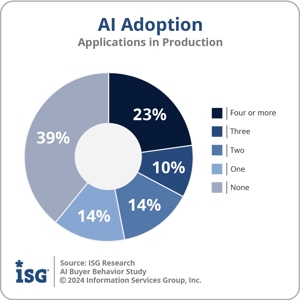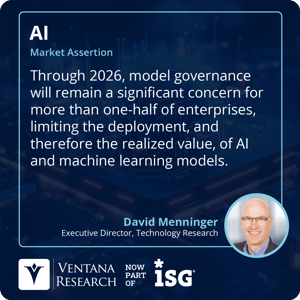Interest in artificial intelligence (AI) is exploding driven in large part by the widespread interest in generative AI. ISG’s AI Buyer Behavior Survey reported that more than 6 in 10 participants have at least one AI application in production. However, despite the ease with which individuals can use AI as a result of natural language processing, creating and managing AI models is still a challenge. First, there is a shortage of skills. Second, the process itself involves many parts, each of which require discipline and governance. The process of managing all these parts is referred to as Machine Learning Operations or MLOps. Domino Data Lab was formed to provide a software platform for MLOps and has since expanded its capabilities into a broader enterprise AI platform.
Founded in 2013, Domino is backed by Coatue Management, Great Hill Partners, Highland Capital, Sequoia Capital and Snowflake Ventures. The company has raised more than $200 million in funding. Domino states its objective is to help enterprises build and operate AI at scale with its Domino Enterprise AI Platform. Its customers include major companies in pharmaceuticals, financial services, insurance, manufacturing, retail and other verticals.
million in funding. Domino states its objective is to help enterprises build and operate AI at scale with its Domino Enterprise AI Platform. Its customers include major companies in pharmaceuticals, financial services, insurance, manufacturing, retail and other verticals.
The Domino platform was originally conceived to help create reproducibility in data science projects. Given all the moving parts, this can be a daunting task. At the heart of the platform is a container-based approach coupled with a repository of the artifacts used to create models such as data pipelines, libraries and environment variables used in the process. The containers ensure the configuration is identical to when the model was created. Reproducibility is a critical element in AI governance. Regulations may require enterprises to be able to reproduce the models, and even those enterprises not subject to regulation should have the discipline to be able to do so. We assert that through 2026, model governance will remain a significant concern for more than one-half of enterprises, limiting the deployment, and therefore the realized value, of AI and machine learning models.
But Domino’s platform goes beyond reproducibility to include all aspects of model development and deployment. The application architecture is divided into four main elements: clients, a control plane, a data plane and external services. Clients include a browser-based user interface, programmatic APIs and a command-line interface. The control plane tracks and monitors data science projects, provides a model registry and has an environment image builder which creates the containers that provide reproducibility. The data plane manages Domino workspaces, jobs and applications. It also manages scaling of clusters and distributed compute clusters where needed for compute intensive workloads. External services are used for object storage, file shares, remote data sources and Git providers. Domino supports fully managed, self-managed and hybrid configurations.
elements: clients, a control plane, a data plane and external services. Clients include a browser-based user interface, programmatic APIs and a command-line interface. The control plane tracks and monitors data science projects, provides a model registry and has an environment image builder which creates the containers that provide reproducibility. The data plane manages Domino workspaces, jobs and applications. It also manages scaling of clusters and distributed compute clusters where needed for compute intensive workloads. External services are used for object storage, file shares, remote data sources and Git providers. Domino supports fully managed, self-managed and hybrid configurations.
Domino supports a wide variety of notebooks and integrate development environments (IDEs) for model development. Models can be deployed as REST endpoints or exported to third-party products such as AWS Sagemaker and Snowflake. Developers can also publish applications that incorporate the models using any HTTP framework. The model registry can be used to register and incorporate external models.
Other recent enhancements include an AI Hub for pre-built templates of common use cases, support for retrieval augmented generation (RAG) and AutoML capabilities. Domino has added GenAI-based coding assistants for jupyter and Visual Studio Code. Users can now also take advantage of cost optimization capabilities to help meet the budgets allocated to specific projects.
Domino has significantly expanded its platform capabilities, providing a robust data science platform that can fit into many organizations existing tool and framework preferences. There is more work to be done. We would expect to see Domino add AI pipelines and orchestrations across multiple models. Prompt management is also an area where vendors are investing more to help with both better accuracy and responsible AI. We also expect Domino to continue to invest in its partner ecosystem with more integration with cloud-based AI services. We recommend that enterprises investing in AI consider how Domino Enterprise AI Platform could support its data science projects and machine learning operations.
Regards,
David Menninger


 million in funding
million in funding elements: clients, a control plane, a data plane and external services. Clients include a browser-based user interface, programmatic APIs and a command-line interface. The control plane tracks and monitors data science projects, provides a model registry and has an environment image builder which creates the containers that provide reproducibility. The data plane manages Domino workspaces, jobs and applications. It also manages scaling of clusters and distributed compute clusters where needed for compute intensive workloads. External services are used for object storage, file shares, remote data sources and Git providers. Domino supports fully managed, self-managed and hybrid configurations.
elements: clients, a control plane, a data plane and external services. Clients include a browser-based user interface, programmatic APIs and a command-line interface. The control plane tracks and monitors data science projects, provides a model registry and has an environment image builder which creates the containers that provide reproducibility. The data plane manages Domino workspaces, jobs and applications. It also manages scaling of clusters and distributed compute clusters where needed for compute intensive workloads. External services are used for object storage, file shares, remote data sources and Git providers. Domino supports fully managed, self-managed and hybrid configurations.








